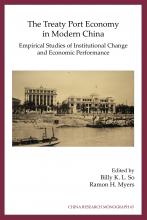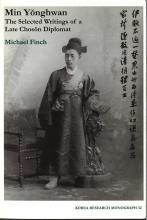In the Service of His Korean Majesty
In the Service of His Korean Majesty
Wayne Patterson
This book on William Nelson Lovatt, Korea's first commissioner of customs in Pusan, looks at the informal imperialism exercised by China over Korea in the 1880s. China's increasing interventionism affected Lovatt's hiring, his experiences in Korea, and his eventual termination. Lovatt's correspondence provides an unprecedented inner history of this important period.
As a nonprofit academic press, we need your support to publish our books. Your gift can help us make more of our titles available as e-books. DONATE NOW
Title information
In this book, Wayne Patterson examines the recently found correspondence, journals, and photographs of William Nelson Lovatt, Korea's first commissioner of customs in Pusan. These materials significantly advance our knowledge of a critical time in the late Chosŏn period. The study's main theme is the transformation of China's policy toward Korea from a largely benevolent policy to an increasingly interventionist policy to a kind of imperialism. A key bellweather in this transformation can be found in the customs service in which Lovatt served.
Wayne Patterson
Wayne Patterson is professor of history at St. Norbert College in Wisconsin. His work addresses modern East Asia and international relations. He is the author of In the Service of His Korean Majesty: William Nelson Lovatt, the Pusan Customs, and Sino-Korean Relations, 1876–1888 (IEAS, 2013).
B.A., History, Swarthmore College; M.A., History, University of Pennsylvania; M.A., International Relations, University of Pennsylvania; Ph.D., International Relations, University of Pennsylvania
In the Service of His Korean Majesty (KRM 35)
Preface – vii
A Note on Romanization, Name Order, and Citation – xiii
PART ONE
1. Introduction – 3
2. Möllendorff and Lovatt: The Early Years – 10
3. Establishment of the Korean Customs Service – 19
4. To Go or Not To Go to Korea? – 25
PART TWO
5. Life in Pusan – 39
6. War and a Coup – 76
7. The Beginning of Trouble and Jennie's Departure – 89
PART THREE
8. Merrill in Charge – 111
9. End Game – 137
10. Departure from Korea – 155
PART FOUR
11. Epilogue – 163
12. Conclusion – 176
Glossary – 183
Bibliography – 185
Index – 190
|
JOURNAL REVIEWS |
|
“Patterson’s lucidly written book presents a unique view on contemporary affairs from the periphery. It will be essential reading for scholars and students interested in the reasons for Korea's tragic decline into eventual foreign subjugation.” ~Martina Deuchler, Emerita SOAS, University of London, in The American Historical Review. (http://ahr.oxfordjournals.org/content/120/3/996.full) |
|
“The book also reveals the isolation and loneliness of life for Westerners in Pusan, especially for Lovatt’s wife, Jennie. This book shines in its treatment of Western lives outside a capital region and its intimate portrayal of family life.... Wayne Patterson’s book is successful in bringing to a human level the effects that the economic, political, social and cultural changes in East Asia had on individuals and communities, both Western and East Asian.” ~Carl Young, Western University, in Pacific Affairs 88, no. 2 (June 2015): 335–337. (http://www.pacificaffairs.ubc.ca/book-reviews/book-reviews-2/recent-book-reviews/book-reviews-vol-88-no-2/#serviceyoung) |
|
“[T]he uniqueness of this volume lies in its detailed account of life in Pusan at a time when Korea was turning the corner from being a ‘hermit kingdom’ to a nation caught in the coils of foreign imperialism. Especially valuable is the detail that Wayne Patterson provides about Pusan, a hybrid city of about 2,000 Japanese traders and fishermen and a separate village of miscellaneous Koreans....The book’s other contribution to historical literature is its window into the workings of the [Imperial Maritime Customs Service] as an unofficial diplomatic lever available for the Chinese to use in Korea....The Lovatt papers are a rich trove of detail regarding daily conditions in Korea and the choices and circumstances faced by foreign officials who took on the lonely and often dangerous assignments associated with Western imperialism in the East.” ~Donald N. Clark, Trinity University, in The Journal of Asian Studies 75, no. 1 (February 2016): 259–260. (http://dx.doi.org/10.1017/S0021911815001941) |
|
“This study focuses on Lovatt’s career in China and Korea, but Patterson’s narrative goes beyond his personal experiences. In addition to providing interesting anecdotes and revealing Lovatt’s personal feelings and prejudices toward Korea, China, and Japan, Patterson’s account provides valuable insights regarding the early establishment of the Korean customs service and the later attempts to merge it more completely with the Chinese customs service.” ~Zhijun Ren, University of Wisconsin-Madison, in Journal of American-East Asian Relations 23, issue 1 (2016): 89–91. (DOI: 10.1163/18765610-02301004) |
|
“A great regret of mine is having only recently found the time to read this wonderful book. Wayne Patterson’s study of William Nelson Lovatt (1838–1904), first Commissioner of Customs at Pusan (1883–1886), tells a good, gripping story and complements a few other, similar works we have. It is a well-wrought biography of an insider to the Korean Customs Service….The resultant book is history at its most authentic, and I can report that the book is refreshingly devoid of mindless distractions about whatever fashionable theory currently clamours for attention.” ~James B. Lewis, University of Oxford, in Acta Koreana 19, no. 1 (June 2016): 389–393. (http://actakoreana.kmu.ac.kr/issue_file/Book%20Reviews%201-2%2019-1.pdf) |
|
"Patterson has given us a detailed and meticulously researched portrait of the Sino-Korean landscape of the early 1880s. At its heart a biography...it is in fact more than the story of one man. Using the bountiful Lovatt letters as his primary source, Patterson has succeeded admirably in the difficult task of weaving the thread of Lovatt’s life into the larger fabric of the historical period, testament to the author’s painstaking research and command of a patchwork of sources beyond just the letters themselves." ~ Daniel C. Kane, University of British Columbia, in Korean Studies (2017, forthcoming) (DOI: https://doi.org/10.1353/ks.2017.0000) |
|
“This monograph on William N. Lovatt is a richly documented biography of a Western expatriate whose life mirrored the changes and transitions taking place in the late nineteenth-century treaty-port settings in China and Korea. This study lucidly illustrates the way domestic and international events in Northeast Asia affected Lovatt and his family. Its detailed account of the everyday life of a Western expatriate family in Pusan in the 1880s is particularly elaborate and gripping.” ~ Cheolbae Son, Yonsei University, in Sungkyun Journal of East Asian Studies 17, no. 1 (April 2017): 114-116. (http://sjeas.skku.edu/upload/201704/SJEAS_17-1_Book%20Review%202_Cheolbae%20SON_hp1.pdf) |
|
[Patterson’s] book contributes to a more nuanced understanding of Korea in the 1880s. For students of both Korean and East Asian history more generally, it provides new materials for understanding the “Chinese Decade” marking the culmination of the Middle Kingdom’s influence on the Korean peninsula and the struggle for control over the peninsula between the Chinese, Japanese, and Russians. ~ Keiran Macrae, Seoul National University, in Seoul Journal of Korean Studies, 30, no. 1 (June 2017): 97-99. (https://muse.jhu.edu/article/665633/pdf) |
|
BLURBS |
|
“This book is a useful corrective to the usual focus on Seoul in studies of early modern Korea. Using newly discovered data, Patterson shows us what life was like in Pusan at that time. He also sheds new light on what China was trying to accomplish in Korea in the 1880s.” ~Don Baker, University of British Columbia |
|
“Wayne Patterson has written an illuminating account of one of the earliest cases of a sustained interaction between Koreans and Westerners. His portrayal of William Nelson Lovatt’s time in Pusan will be of interest to students and scholars of Chosŏn Korea’s foreign relations—political, commercial, and cultural.” ~Kirk W. Larsen, Brigham Young University |



